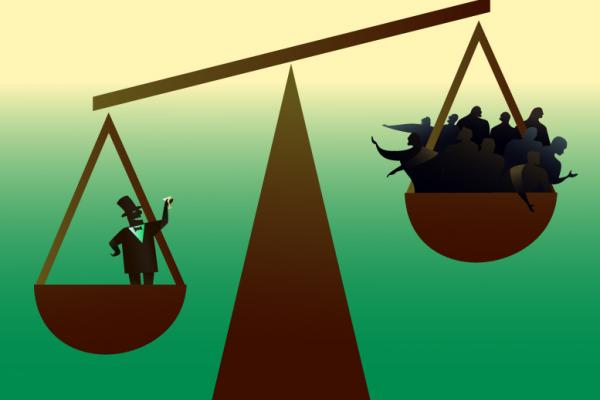This week, there was a lot of commentary about the State of the Union, the title of the president’s annual January speech before a joint session of Congress. I thought it was one of Obama’s best addresses recently because he focused on what is real for this country — growing economic inequality where only a few are doing “spectacularly well” while many families are still struggling just to get by.
The wife and mother from one of those families wrote the president a letter that seemed to have moved him, so he lifted up her “tight-knit family” trying to get through “hard times,” as she sat up in the gallery next to first lady Michelle Obama. Her family became a parable for the nation that is starting to do better economically but still faces hard choices that the president sought to address with very practical suggestions to support what he called “middle class economics."
Obama’s proposals for shifting tax breaks from the very wealthy to the middle class, to make possible child tax credits, days for sick leave, assistance with child care, and some relief from expensive educational costs are all proposals not likely to be supported by the new Republican Congress. But the speech begins to set what could be a long-term agenda to deal with our massive economic inequality — finally. Even the Republicans now might have to face up to the increasingly visible, embarrassing, alarming, and morally indefensible gaps between a small elite and the rest of the country.
The state of the union certainly isn’t good for the poorest and most vulnerable Americans, especially for the children who live in poverty — one in every five American children, and one of every three children of color. A stunning new statistic just came out showing that most of our public school students now are living in poverty. A majority of kindergarten- to twelfth-grade kids in America’s public schools show up to class each day poor and often hungry.
The state of the union is also not good for millions of undocumented people who wonder if the new Republican Congress will turn back the protections just offered them by the president’s executive orders. They are watching and waiting to see if their families will be split up. The state of things is clearly not good for millions of young African Americans who don’t trust the police officers who are supposed to serve and protect them to really do that.
Also this week, similar discussions are going on in Switzerland at the annual World Economic Forum meeting in Davos. Here too, growing economic inequalities in both developed and emerging economies are at the center of many public and personal conversations here, like the one I moderated this morning called “Stop and Think: Who Matters?” The young people in Ferguson, Mo., the young women in many conflicted countries, and the lost young workers in economies all over the world were all in the conversation.
Values have become a subversive conversation at Davos, especially with young entrepreneurs who want to see business as purposeful and not just profitable. “Young Global Leaders” (in their 30s and 40s) and “Global Shapers” (in their 20s) from many sectors are discussing how to make social change. People from the faith community are also at Davos, and others here are responding positively to the kind of religion that plays a crucial and prophetic role in addressing the hardest and most challenging questions — including economic inequality and what would lead to “inclusive growth.” Even very secular leaders at Davos are saying “you are doing God’s work in lifting these things up.”
What God’s point of view might be on issues of poverty and massive inequality is a topic of conversation here, and I smile when I hear Pope Francis quoted so often at Davos! The Scriptures are very clear — the test of a nation’s righteousness is how it treats the most excluded, the ones Jesus called the least of these. I always remind the people who come to Davos that they are likely the most included people on the planet — and that the relationship between the most included and the most excluded in is the moral test of our time.
Last week, back in the United States, the Circle of Protection announced a letter signed by more than 100 Christian leaders that will be sent to every political candidate who decides to run for president in the 2016 election. All those prospective candidates are in the “donor primary” right now. But those who choose to run will get a letter from faith leaders asking them to make a clear statement about how they will act to reduce and ultimately end poverty and hunger in the United States and globally. They’ll be asked to answer in a video what the priority of overcoming poverty — at home and abroad — would be in their administration. What will they do to address poverty and find fresh, new, and committed solutions?
That is also the question that is being put to business leaders, non-governmental organization leaders, and political leaders who are all here in Davos. Ironically, that’s the question the young Ferguson leaders asked a group of us faith leaders who met with them in December, “What are you going to do?”
Jim Wallis is president of Sojourners. His book, The (Un)Common Good: How the Gospel Brings Hope to a World Divided, the updated and revised paperback version of On God’s Side, is available now. Follow Jim on Twitter @JimWallis.
Image: durantelallera / Shutterstock.com
Got something to say about what you're reading? We value your feedback!
